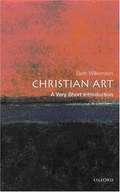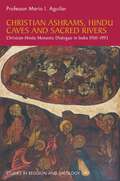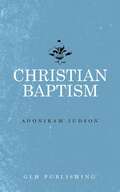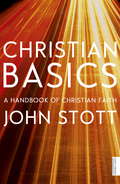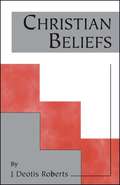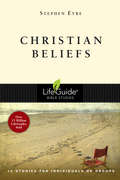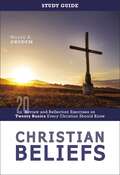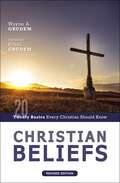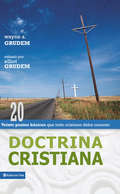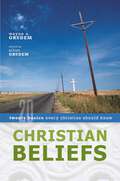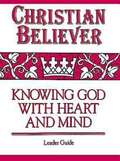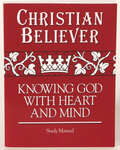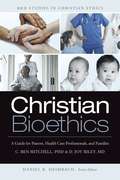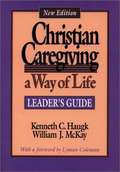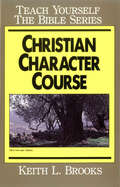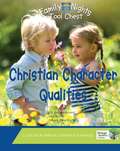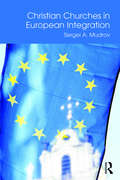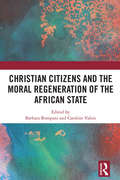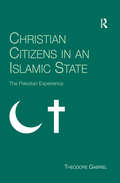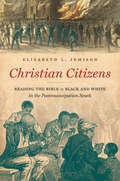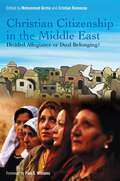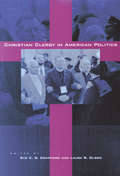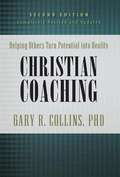- Table View
- List View
Christian Art: A Very Short Introduction
by Beth WilliamsonThis Very Short Introduction decodes the key themes, signs, and symbols found l in Christian art: the Eucharist, the image of the Crucifixion, the Virgin Mary, the Saints, Old and New Testament narrative imagery, and iconography. It also explores the theological and historical background of Christian imagery, from the devotional works of the Medieval and Renaissance periods, to the twenty first century. Williamson uses examples from, among others, Cimabue, Michelangelo, and Rosetti. She concludes by outlining the co-existence in contemporary "post-Christian" culture of the deliberately controversial works of artists such as Andres Serrano and Chris Ofili, alongside the consciously devotional works of those such as Eric Gill and Peter Blake.
Christian Ashrams, Hindu Caves and Sacred Rivers: Christian-Hindu Monastic Dialogue in India 1950-1993
by Mario I. AguilarIn late 20th-century India, Christian-Hindu dialogue was forever transformed following the opening of Shantivanam, the first Christian ashram in the country. Mario I. Aguilar brings together the histories of the five pioneers of Christian-Hindu dialogue and their involvement with the ashram, to explore what they learnt and taught about communion between the two religions, and the wide ranging consequences of their work. The author expertly threads together the lives and friendships between these men, while uncovering the Hindu texts they used and were influenced by, and considers how far some of them became, in their personal practice, Hindu. Ultimately, this book demonstrates the impact of this history on contemporary dialogue between Christians and Hindus, and how both faiths can continue to learn and grow together.
Christian Baptism
by Adoniram JudsonA sermon on Christian baptism, with many quotations from Pedobaptist authors. To which are added a letter to the church in Plymouth, Massachusetts, and an address on the mode of baptizing. This work marks missionary Adoniram Judson's watershed decision to become a Baptist. He uses numerous sources to argue that the mode of baptism should be by immersion and that the recipients should always be individuals who have personally believed in Jesus Christ for salvation.
Christian Basics
by John StottChristianity the world's largest religion: almost a third of the population describe themselves as Christian. Over 2000 years since it first started, no other religion has had such cultural and global impact and millions today claim their lives are completely changed by their decision to be a Christian.But what is a Christian and how do you become one? What do Christians actually believe and how does that impact their everyday life?As an introduction to Christianity or a refresher course in the essentials, Christian Basics is a concise but comprehensive guide.· How to become a Christian· How to grow as a Christian· Belief in God, Jesus and the Holy Spirit· Why church is important· What a Christian life looks like.'At whatever stage of your spiritual journey, I pray that something or other in this little book may help you to grow in the grace and knowledge of our Lord and Saviour Jesus Christ'John Stott
Christian Basics: Basic Christianity (Christian Basics Bible Studies)
by John StottChristianity the world's largest religion: almost a third of the population describe themselves as Christian. Over 2000 years since it first started, no other religion has had such cultural and global impact and millions today claim their lives are completely changed by their decision to be a Christian.But what is a Christian and how do you become one? What do Christians actually believe and how does that impact their everyday life?As an introduction to Christianity or a refresher course in the essentials, Christian Basics is a concise but comprehensive guide.· How to become a Christian· How to grow as a Christian· Belief in God, Jesus and the Holy Spirit· Why church is important· What a Christian life looks like.'At whatever stage of your spiritual journey, I pray that something or other in this little book may help you to grow in the grace and knowledge of our Lord and Saviour Jesus Christ'John Stott
Christian Beliefs
by J. Deotis RobertsThis book is designed for those who desire a basic understanding of Christian life and thought. It can be used for personal and family study and devotion. However, it is most appropriate for instruction in Christian doctrine in a congregational setting.
Christian Beliefs (LifeGuide Bible Studies)
by Stephen EyreChristian beliefs are vital to Christian living. They are the foundation of your relationship with God���and even with others. So . . . what do Christians believe? In this twelve-session LifeGuide Bible Study, Stephen Eyre introduces one by one twelve key tenets of the Christian faith. Here is what you need to know (and tell others!) about God, Christ, the Holy Spirit, human nature, sin, salvation, holiness, the church, mission, revelation and the last things. For over three decades LifeGuide Bible Studies have provided solid biblical content and raised thought-provoking questions���making for a one-of-a-kind Bible study experience for individuals and groups. This series has more than 130 titles on Old and New Testament books, character studies, and topical studies. PDF download with a single-user license; available from InterVarsity Press and other resellers.
Christian Beliefs Study Guide: Review and Reflection Exercises on Twenty Basics Every Christian Should Know
by Wayne A. GrudemThis STUDY GUIDE is a companion resource to Wayne Grudem's Christian Beliefs, revised edition. Not every Christian needs to go to seminary, but there are certain teachings of the Bible that every Christian should know. Whether you're a relatively new believer in Jesus or a mature Christian looking for a better understanding of basics of the faith, the Christian Beliefs Study Guide can help you reflect on and deeply internalize the core teachings of Christianity, when used in conjunction with Christian Beliefs, revised edition (sold separately).This STUDY GUIDE will help you think through important topics like:The Bible and its authority for our livesThe characteristics of GodThe importance of prayerAngels and the reality of spiritual warfareWhat it means that we are created in the image of GodWhat God has done for us in ChristThe purpose of the churchWhat happens when Christ returnsThe biblical understanding of heavenAnd much moreChapter by chapter, this STUDY GUIDE will lead you to examine and reflect on Christian Beliefs, revised edition (sold separately), by providing:Summary: A short summary of the chapter to help remind readers what they read.Key terms: Definitions of important terminology introduced in the chapter.Key quotes: Selection of one or two key quotes from the chapter.Central Scripture Passage: An important biblical passage related to the chapter for reflection or memorization.Content Questions: Questions that reflect on the theological content of the chapter.Practical Application Questions: Questions that help tie the theological content of the chapter to real-life situations.For Further Reading: Lists where to find more information on theological topics in Systematic Theology, second edition, by Wayne Grudem so readers know where to go for a deeper dive into specific subjects they want to know more about.The Christian Beliefs Study Guide is the ideal resource for every Christian who wants a solid foundation for understanding the most basic and essential teachings of the Bible.
Christian Beliefs, Revised Edition: Twenty Basics Every Christian Should Know
by Wayne A. GrudemLearn the Teachings of the Bible that Every Christian Must Know. Now Revised and Updated. Over 300,000 Copies Sold!Not every Christian needs to go to seminary, but there are certain teachings of the Bible that every Christian should know. Whether you're a relatively new believer in Jesus or a mature Christian looking for a better understanding of basics of the faith, Christian Beliefs is for you.This readable guide to twenty basic Christian beliefs condenses Wayne Grudem's award-winning book Systematic Theology, prized by pastors and teachers everywhere. He and his son, pastor Elliot Grudem, have boiled down the essentials of theology for everyday Christians and made them both clear and applicable to life. Each brief chapter concludes with questions for personal review or group discussion.In this revised and updated edition of Christian Beliefs, you will learn about:The Bible and its authority for our livesThe characteristics of GodThe importance of prayerAngels and the reality of spiritual warfareWhat it means that we are created in the image of GodWhat God has done for us in ChristThe purpose of the churchWhat will happen when Christ returnsThe biblical understanding of heavenAnd much moreChristian Beliefs is the ideal book for every Christian who wants a solid foundation for understanding the most basic and essential teachings of the Bible.
Christian Beliefs: Twenty Basics Every Christian Should Know
by Wayne Grudem Elliot GrudemGod doesn't call every Christian to go off to seminary, but there are certain matters of doctrine--that is, the church's teaching--that every Christian simply must know. Theology is important because what we believe affects how we live. If you're a relatively new believer in Jesus, or if you're a more mature Christian looking for a quick brush-up on basics of the faith, Christian Beliefs is for you. This readable guide to twenty basic Christian beliefs is a condensation of Wayne Grudem's award-winning book on systematic theology, prized by pastors and teachers everywhere. He and his son, Elliot, have boiled down the essentials of Christian theology for the average layperson and made them both clear and applicable to life. You will learn about the Bible, the characteristics of God, what it means that we are created in the image of God, what God has done for us in Christ, the purpose of the church, and much more. Each chapter includes questions for personal review or group discussion. These truly are twenty basic beliefs that every Christian should know.
Christian Beliefs: Twenty Basics Every Christian Should Know
by Wayne Grudem Elliot GrudemGod doesn't call every Christian to go off to seminary, but there are certain matters of doctrine--that is, the church's teaching--that every Christian simply must know. Theology is important because what we believe affects how we live. If you're a relatively new believer in Jesus, or if you're a more mature Christian looking for a quick brush-up on basics of the faith, Christian Beliefs is for you. This readable guide to twenty basic Christian beliefs is a condensation of Wayne Grudem's award-winning book on systematic theology, prized by pastors and teachers everywhere. He and his son, Elliot, have boiled down the essentials of Christian theology for the average layperson and made them both clear and applicable to life. You will learn about the Bible, the characteristics of God, what it means that we are created in the image of God, what God has done for us in Christ, the purpose of the church, and much more. Each chapter includes questions for personal review or group discussion. These truly are twenty basic beliefs that every Christian should know.
Christian Believer Leader Guide: Knowing God with Heart and Mind (Disciple Ser.)
by VariousThe leader guide provides two kinds of information: (1) suggestions for weekly group sessions; (2) information to enhance leadership skills, to support group building and maintenance, and to make effective use of the CHRISTIAN BELIEVER components.A one-page session plan for each of the thirty weeks follows a set procedure with an amount of time indicated for each step. Each session plan provides guidance for group activities that make use of the daily preparation members have made, and questions for discussion. Group activities are designed to focus on content and help persons connect Scripture, doctrine, believing, and living.The leader guide assumes that: The leader makes the same preparation for the weekly group session as the other members of the group. Study and discussion in the weekly session is done mainly in small groups. The leader both guides the process and participates with other group members in the small-group study and discussion. The leader is not an information-giver or lecturer. The leader and the group members have access to the same content for study and discussion—the assigned Scripture, selections from the book of Readings, the study manual, and the video presentations. A study of CHRISTIAN BELIEVER can renew lives and congregations.
Christian Believer Study Manual: Knowing God with Heart and Mind (Disciple Ser.)
by J. Ellsworth KalasThe study manual guides daily reading in Scripture and in the Book of Readings. It encourages daily prayer while providing space for taking notes for use in weekly group discussion.Each lesson includes an explanation and commentary on the doctrines being studied, raises questions for reader reflection and written response, and suggests ideas for additional reading and study.The Christian Believer program focuses on classical teachings of the Christian faith—presenting, explaining, and interpreting them in a way that participants can understand, through the use of words, symbols, and hymns. Over a 30-week period, participants will examine the writings of ancient and modern Christian commentators and view video presentations by leading Bible scholars.
Christian Bioethics: A Guide For Pastors, Health Care Professionals, And Families (B&H Studies In Christian Ethics Series)
by C. Ben Mitchell D. Joy RileyLiving in an era of highly technical medicine is comforting and sometimes confusing. How should Christians make life and death decisions? How do we move from an ancient text like the Bible to twenty-first-century questions about organ transplantation, stem-cell research, and human cloning? What kind of care do we owe one another at the end of life? Is euthanasia a Christian option? <P><P> Using a dialogue format, an ethicist and physician talk about how to think about thorny ethical issues. Combining their backgrounds in medicine and theology, they deal with real-life moral questions in an accessible way. C. Ben Mitchell and D. Joy Riley let readers eavesdrop on their conversation about the training of doctors, the interpretation of the Bible, and controversial issues like abortion, assisted-suicide, genetic engineering, and in vitro fertilization. <P><P> The book examines these topics under three general headings: the taking of life, the making of life, and the faking of life. Christian Bioethics is a guidebook for pastors, health care professionals and families—anyone facing difficult decisions about health care.
Christian Caregiving - A Way of Life, Leader's Guide
by Kenneth C. Haugk William J. MckayThis leader's guide makes it easy to build community and train church members in distinctively Christian caring and relating skills.
Christian Character Course- Teach Yourself the Bible Series (Teach Yourself the Bible)
by Keith BrooksThe Teach Yourself the Bible Series is one of the best New Testament studies you will find anywhere. Each book in the series is packed full of valuable questions on individual chapters of the Bible, check-ups to test your grasp of scriptural truths, and usable suggestions for group study.Grow in your knowledge of God through each New Testament book, then go on to study six aspects of Christianity essential for all believers: doctrine, prayer, eternal life, prophecy, Christian character, and Bible study.What does it really mean to be a Christian? Christian Character Course is a look at subjects having to do with Christian ethics and practical Christian service. Study the characteristics of a true believer in this important volume.Strengthen your relationship with the living God with all twenty-five books of the Teach Yourself the Bible Series. Each volume is a timeless, yet practical, study of the Word of God.
Christian Character Qualities
by Kurt Bruner Jim WeidmannThis book contains complete and clear plans for helping kids learn more about Christian characters and qualities.
Christian Churches and Their Peoples, 1840-1965
by Nancy Christie Michael GauvreauReligious institutions, values, and identities are fundamental to understanding the lived experiences of Canadians in the nineteenth- and early twentieth-century. Christian Churches and Their Peoples, an inter-denominational study, considers how Christian churches influenced the social and cultural development of Canadian society across regional and linguistic lines.By shifting their focus beyond the internal dynamics of institutions, Nancy Christie and Michael Gauvreau address broad social issues such as the ways in which religion is linked to changing mores, the key role of laypeople in shaping churches, and the ways in which First Nations peoples both appropriated and resisted missionary teachings. With an important analysis of popular religious ideas and practices, Christian Churches and Their Peoples demonstrates that the cultural authority and regulatory practices of religious institutions both affirmed and opposed the personal religious values of Canadians, ultimately facilitating their elaboration of personal, ethnic, gender, and national identities.
Christian Churches in European Integration
by Sergei A. MudrovAll too often religion is largely ignored as a driver of identity formation in the European context, whereas in reality Christian Churches are central players in European identity formation at the national and continental level. Christian Churches in European Integration challenges this tendency, highlighting the position of churches as important identity formers and actors in civil society. Analysing the role of Churches in engaging with two specific EU issues – that of EU treaty reform and ongoing debates about immigration and asylum policy – the author argues that Churches are unique participants in European integration. Establishing a comprehensive view of Christian Churches as having a vital role to play in European integration, this book offers a substantial and provocative contribution both to our understanding of the European Union and the broader question of how religious and state institutions interact with one another.
Christian Citizens and the Moral Regeneration of the African State
by Barbara Bompani Caroline ValoisIn recent years the rapid growth of Christian charismatic movements throughout sub-Saharan Africa has drastically reconfigured the region’s religious landscape. As a result, charismatic factions play an increasingly public role throughout Africa, far beyond the religious sphere. This book uses a multi-disciplinary approach to consider the complex relationship between Pentecostal-charismatic Christianity and the socio-political transformation taking place throughout this region. Each of this text’s three main sections helps in understanding how discourses of moral regeneration emanating from these diverse Christian communities, largely charismatic, extend beyond religious bounds. Part 1 covers politics, political elites and elections, Part 2 explores society, economies and the public sphere, and Part 3 discusses values, public beliefs and morality. These sections also highlight how these discourses contribute to the transformation of three specific social milieus to reinforce visions of the Christian citizen. Examining contemporary examples with high quality scholarly insight, this book is vital reading for academics and students with an interest in the relationship between religion, politics and development in Africa.
Christian Citizens in an Islamic State: The Pakistan Experience
by Theodore GabrielChristian Citizens in an Islamic State deals with the important question of inter-faith relations in Pakistan, a vital region of the Islamic world which has been the scene of the rise of both Islamic militancy and partnership with the West in counter-terrorism measures. Christians are the most important religious minority of Pakistan and their status and experience is a test case of the treatment of religious minorities in an Islamic state. This book covers new ground in exploring the various factors that govern the relations between Muslims and Christians in a nation state which has been politically unstable in the past, and where the imposition of Islamic law has been controversial and problematic for religious minorities. Theodore Gabriel clarifies the history of Christian-Muslim relations in the region, explores the rise of Islamic militancy, and draws on personal interviews to determine the mind set of both Christians and Muslims in Pakistan today.
Christian Citizens: Reading the Bible in Black and White in the Postemancipation South
by Elizabeth L. JemisonWith emancipation, a long battle for equal citizenship began. Bringing together the histories of religion, race, and the South, Elizabeth L. Jemison shows how southerners, black and white, drew on biblical narratives as the basis for very different political imaginaries during and after Reconstruction. Focusing on everyday Protestants in the Mississippi River Valley, Jemison scours their biblical thinking and religious attitudes toward race. She argues that the evangelical groups that dominated this portion of the South shaped contesting visions of black and white rights. Black evangelicals saw the argument for their identities as Christians and as fully endowed citizens supported by their readings of both the Bible and U.S. law. The Bible, as they saw it, prohibited racial hierarchy, and Amendments 13, 14, and 15 advanced equal rights. Countering this, white evangelicals continued to emphasize a hierarchical paternalistic order that, shorn of earlier justifications for placing whites in charge of blacks, now fell into the defense of an increasingly violent white supremacist social order. They defined aspects of Christian identity so as to suppress black equality—even praying, as Jemison documents, for wisdom in how to deny voting rights to blacks. This religious culture has played into remarkably long-lasting patterns of inequality and segregation.
Christian Citizenship in the Middle East: Divided Allegiance or Dual Belonging?
by Nigel Biggar Mohammed Girma Ben Ryan Casey Strine Cristian Romocea Issa Diab Najib Awad Paul S. WilliamsFor Christians living as a persecuted minority in the Middle East, the question of whether their allegiance should lie with their faith or with the national communities they live in is a difficult one. This collection of essays aims to reconcile this conflict of allegiance by looking at the biblical vision of citizenship and showing that Christians can live and work as citizens of the state without compromising their beliefs and make a constructive contribution to the life of the countries they live in. The contributors come from a range of prestigious academic and religious posts and provide analysis on a range of issues such as dual nationalism, patriotism and the increase of Islamic fundamentalism. An insightful look into the challenges religious minorities face in countries where they are a minority, these essays provide a peace-building and reconciliatory conclusion for readers to consider.
Christian Clergy in American Politics
by Sue E. S. CrawfordIn recent decades, Christian clergy have ever more frequently had to decide whether to become involved in politics. When they do become involved, their influence can be substantial. In this book Sue E. S. Crawford, Laura R. Olson, and their coauthors explore the political choices clergy make and the consequences of these choices. Drawing on personal interviews and statistical data to place the actions of clergy in both their religious and secular contexts, the authors study mainline and evangelical Protestant, Catholic, and Mennonite communities. They examine the role of white, African American, and female religious leaders. And they address issues of local development, city government, and national and international politics.Contributors: Christi J. Braun, Boston University School of Law • Timothy A. Byrnes, Colgate University • James C. Cavendish, University of South Florida • Sue E. S. Crawford, Creighton University • Katie Day, Lutheran Theological Seminary at Philadelphia • Melissa M. Deckman, Washington College • Paul A. Djupe, Denison University • Joel S. Fetzer, Central Michigan University • James L. Guth, Furman University • Ted G. Jelen, University of Nevada-Las Vegas • Laura R. Olson, Clemson University • James M. Penning, Calvin College • Mary R. Sawyer, Iowa State University • Corwin E. Smidt, Calvin College
Christian Coaching: Helping Others Turn Potential into Reality
by Gary R. CollinsWith a biblically based approach, this groundbreaking textbook for life coaching presents a coaching model using how-to sections field-tested for more than eight years, custom forms coaches can use, and more.
